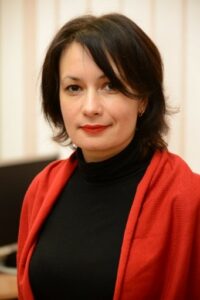Interview with Dr. Ellana Molchanova, VolkswagenStiftung scholarship holder at FAU

 |
Dr. Ellana MOLCHANOVA
|
Dear Ellana, PACT4Ukraine project is grateful for your close and fruitful cooperation during this difficult period for Ukraine. We are pleased to begin a series of interviews with representatives of the Ukrainian academic community at the FAU with a conversation with you.
First of all, we are interested in how you are connected to the FAU. Who was your guide to the university’s scientific community?
Prof. Dr. Dirk Holtbrügge, Chair of International Management in the School of Business, Economics and Society is very supportive of Ukrainian scientists and demonstrated solidarity with our country from the first days of the full-scale war. He asked the Ukrainian students who were studying at the FAU at the time if any of the Ukrainian scientists needed help and support. My former student was just in contact with me and introduced me to the professor. Along with the fact that the professor is a very empathetic person, our scientific interests coincided, which allowed us to start research cooperation, which included applying for a scholarship from the Volkswagen Foundation.
This is an important practical confirmation that there are indeed common scientific interests of Ukrainian and German scientists. Could you please specify what scientific problems you have been researching as part of the scholarship program?
Yes, indeed, in the first months of the war, the attention of economists around the world was focused on the problems of analysis, research of phenomena, and most importantly, political and economic forecasts of the impact of the Russian-Ukrainian war on the global market.
Thus, the main issues for joint scientific research were:
- what are the comparative advantages of Ukraine (e.g., low labor costs, fertile land, etc.), and which forms of foreign trade and FDI will be most likely/most effective?
- which industries have the greatest potential for exports and FDI?
- how could the Ukrainian government support the development of foreign trade and FDI?
- how could Western countries support the development of foreign trade and FDI (e.g., free-trade agreements, investment protection treaties, etc.)?
These issues formed the basis for writing scientific articles and reports at conferences.
These topics are indeed relevant. Looking at your portfolio, we can also note that you are also actively involved in project activities. Do you manage to pay attention to the planning and implementation of projects supported by European funds?
Of course, by searching for project applications, I try to keep in touch with my home university. My stay in Germany ensures the safety of my son and me, but I am sure that even abroad, every Ukrainian does everything possible to support their country. Academic connections, including those acquired during my time at the FAU, allow us to expand our network and unite for the sake of joint projects. For example, the State University of Economics and Trade participated in FAU-Help – FAU Digital Education Helping Ukraine project during the winter semester of 2022. Digital courses offered by the FAU in the field of economics and key qualifications with a total of approximately 35 courses, were designed and adapted for use by partner Ukrainian universities. It was a great support for our university those days and also allowed us to see what kind of courses are interesting for our students and to think how we could improve the study programmes. Just now we received the great news about the Erasmus+ project Jean Monet’s “European Integration of Ukraine in the Public Finance Management System” will be realized during 2023-2026.
At the moment I`m working on creating new partnerships and projects but I think it`s too early to talk about potential results of them. Let`s wait for a while.
For sure! We wish you the best of luck and will wait for our next dialogue to hear about them!

